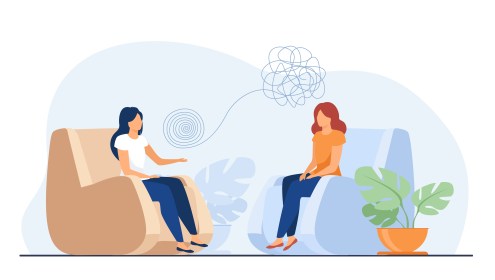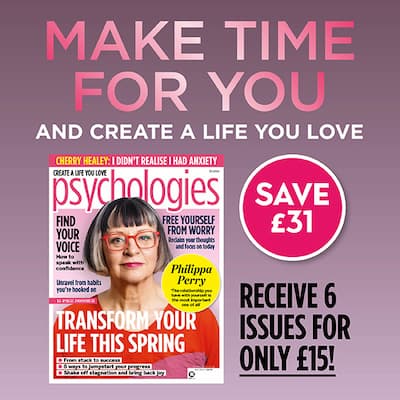Can you save your relationship – by yourself?
Is it possible to bring your relationship back from the brink of break-up by doing an online course without your partner? Ella Deane decided to find out

The first utterance of the D-word wasn’t by me. I was standing at the side of the motorway in the pouring rain with Katie, my eight-year-old daughter, and my sons Jake, 11, and Charlie, 13, and had just left a rant on voicemail for Pete, my husband of 17 years. He had been promising to get the car fixed for weeks. ‘Are you going to divorce Daddy?’ asked Katie.
It was the catalyst moment. By the end of the week, I had signed up to the Psychologies Save Your Relationship e-course, created by expert Sarah Abell. It promised that it only takes one person to change the dynamic of a relationship… and I didn’t tell Pete that I was doing it because I was afraid it would just cause more arguments.
Week one: All by myself
In the first video, Abell talks about the need to heed the warning lights in our relationships if we are to stop them from breaking down – just like a car. I hope it isn’t an omen: that night on the motorway ended in our car being towed away, and the garage said they might not be able to fix it. Pete and I are running on empty.
I am working full-time, as well as cooking, cleaning and organising the children. Pete is working crazy hours, plus doing long commutes. It feels as if the only time we speak is to argue about which of us is the most tired.
‘If you are in a difficult place, emotionally low, hormonal, bored, lonely, struggling in your career, overstretched, unfit or exhausted, then you are going to find it harder to invest in your relationship,’ says Abell. I can tick all those boxes.
Stress has left me binge-eating, drinking far too much wine in the evenings and not sleeping very well. I realise that I am lonely. I feel totally disconnected from Pete. I miss him. I miss us.
Abell encourages us to write in a journal, answering the questions: What are your happiest memories of being together? What are the qualities that you admire in your partner? Pete is a big Northern bear of a man. When we met, he was full of good humour; a grafter. He was loyal and great fun. No one could make me laugh like Pete. It is a long time since I’ve focused on Pete’s good qualities.
Another exercise is to create a timeline of our relationship. Abell say that couples who put a positive spin on their relationship history are more likely to have a happier future. I plot out our history. The early years were lovely – Pete was around more and we shared the childcare.
Then, two years ago, he got an amazing job, but it was a 90-minute commute each way. My father had moved abroad at the same time. Up until that point, they had both been around more to help out, to talk to. This exercise helps me realise that I feel I have lost both of them from my life – and I feel completely unsupported.
Week two: Will you dance with me?
In the second week, the course looks at the dynamic or ‘dance’, as Abell calls it, of your relationship. Are you a withholder; you withdraw because you feel rejected and inadequate? Or a pursuer; you demand attention because you feel alone, unappreciated and invisible? Oh dear! I am definitely a pursuer. And Pete is a withholder.
Our dynamic is not being helped by our communication style. I learn that there are four ways that you can doom your relationship, in terms of communication: criticism; contempt (if you could have heard that roadside voicemail!); defensiveness; and stonewalling (even the children talk about Pete’s man cave in the garage). I start to see what a destructive tango we have been doing.
The answer? Try a new dance: appreciation; respect; being vulnerable, rather than accusing; apologising; forgiving; getting physical with a hug; using humour to disarm… Abell also recommends the 5:1 technique. She teaches that, for every criticism or negative comment, you need to offer five positive ones. My ratio has probably been the reverse of that.
At the weekend, I thank Pete for taking the dog out so that I can have a lie-in. When he picks up the car from the garage (they managed to fix it), I hug him and don’t nag about sorting out breakdown cover. (I hear him later on the phone, sorting it out.)
On Saturday evening, I suggest that we take the dog out for a walk together, without the children, I ask his advice over a dilemma at work. He talks sense and I feel supported. On the way home, he starts telling a funny story about one of his clients and it makes me howl with laughter. The children fall silent as we walk through the door. Katie says, ‘You’re laughing… Why are you laughing?’
Week three: Learning to speak a different language
In the third week, I learn about the five languages of love, namely, words of affirmation; quality time; receiving gifts; acts of service; and physical touch. The idea is that we all show our love in ‘languages’ and, if you and your partner are speaking different languages, you can feel disconnected.
I had realised in the first couple of weeks of the course that I felt loved and supported when Pete spent time with me and helped me with the children – so my love languages are acts of service and quality time. I guess that Pete’s language is touch because his default approach to most things is a bear hug. Lately, I had avoided his approaches, but Abell says you need to change the dance by speaking your partner’s language.
In the middle of the week, Pete gets home late. I pour him a glass of wine and give him a hug. We slump next to each other on the sofa, watching the news, and I reach over and hold his hand. After five minutes, he clicks the TV off and asks me about my day and the big project I’ve just pitched for.
Week four: New priorities
Abell suggests that we prioritise our partners above all other people this week. I constantly put everyone before Pete – the children, my friends, family, even the dog.
I book a babysitter and a table at a local restaurant. Then I confess to Pete that I have been doing the course, and tell him what Katie said about us getting divorced – and what I’ve subsequently learned about relationships. I say how sorry
I am that I’ve been so negative and explain that I need support. I tell him how much I love him and how I want us to work. Pete doesn’t say a word, he listens to me until I finish speaking, then he gets up and, in the middle of the restaurant, he pulls me in for a bear hug.
One month later: Onwards and upwards
That night after dinner, Pete asked if he could do the course, too. Now, he says he loves that he has a manual to follow. Life hasn’t become any less busy – but we are making more time for us. We know we lost each other for a while, but the course is helping us practise specific techniques to find a way to return to each other. Our car is definitely back on the road.
Not sure if you’re ready? Try our sample e-course for free here.
Photograph: iStock









